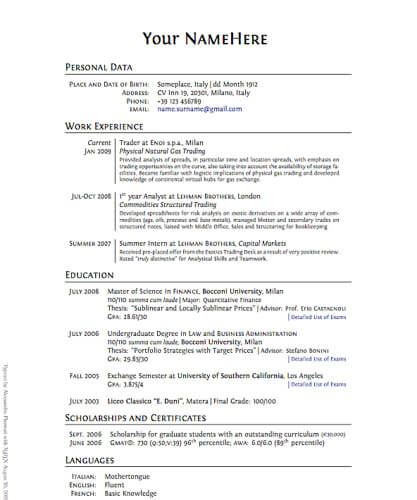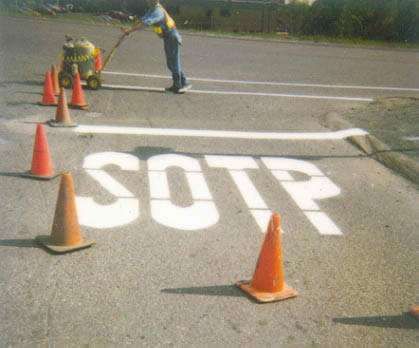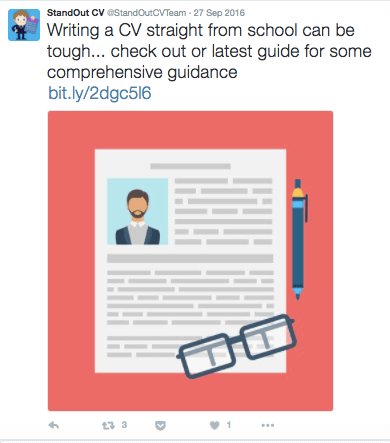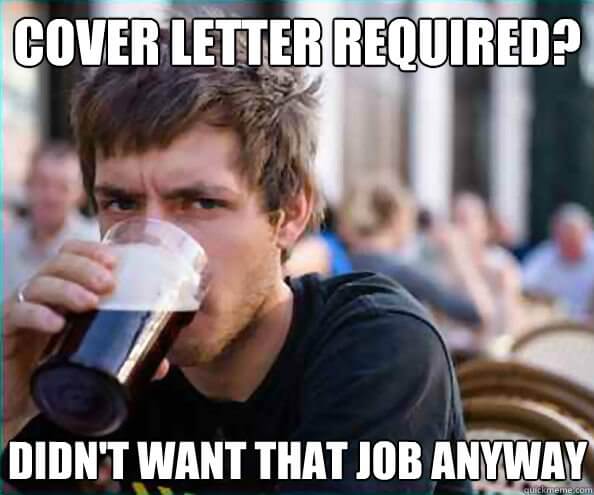So you’re looking for internships or a real adult job, huh? Great job description, check. Writing samples, check. CV, uh, say what now? Moving on to the next one…but wait, what if you no longer needed to automatically ignore every application that asked for a CV instead of that good old resume and cover letter combo?
Make Your CV Look Like This:

CV Breakdown
1. The Essentials
Pretty obvious, but make sure to include your name and contact info at the top (with a phone number you’ll actually answer). Without the basics, your CV is nothing more than a random document that lists impressive accomplishments for some random anonymous person. Not exactly the impression you want to leave.
Example:
Sarah Parker
204 1st St Apt. 123 [email protected]
Seattle, WA 98101 (206) 466 6021 (mobile)
2. Education
Now, list your school with its full name, majors or degrees received and your graduation date. List everything in reverse chronological order so that the most recent is first. If you have any theses or dissertations, list those too. You worked hard on them, so why not brag?
Example:
B.A. English Literature with a Creative Writing emphasis
University of Washington, Seattle, WA
Graduation Date: June 2016
3. Achievements
If you’ve got ‘em, flaunt ‘em. Awards, any important accomplishments such as helping your professor finish an important research project and more will find their new home here.
4. Work/Teaching/Research Experience
Were you a TA? What about any internships or time you spent doing research with your favorite Psych professor? This is the section to include all of those details. Just like in a resume, for any TA or research experience make sure to list the class, the school and of course the professor. You should know the drill for work experience, but basically you should only include relevant positions. In other words, nobody really cares about your deli experience if you’re applying for a writing position. As always, reverse chronological is your new BFF, as is listing only the most important and relevant things.
Example:
Marketing Intern, March 2016-present
Allied Integrated Marketing, Seattle WA
Brainstormed and implemented promotional ideas to the Seattle region for upcoming films
Researched potential partners for film promotions
5. Skills
Just like in a resume, use this section for any awesome skills you’ve picked up along the way. If you’re an expert in SEO and applying for journalism positions, definitely include that. But more obvious things like Microsoft Word which everybody and their mother knows how to use can be left out.
Example:
Experience interviewing different sources to write creative articles catered towards college students
Proficient with WordPress and iMovie
6. Any publications
If you’ve written for your school paper, published articles in an online publication or self-published a novel, write them (pun intended) here. This is especially helpful because these don’t exactly belong in the education section like your theses or dissertations might, but you’ll still want to include them to make you seem all the more impressive.
7. Interests/Volunteer work
Sound familiar? Use this section to list interests (nothing weird like your obsession with Gilmore Girls) and volunteering experience you may have.
What exactly is a CV?
CV stands for curriculum vitae. Think of it as a longer version of a resume, where you can go into more detail and list more experiences and accomplishments. In your resume, you just quickly list things that make you impressive AF, but in a CV you talk about more and give the employer a more complete picture of everything you’ve done.
What’s the difference between a CV and a resume?
A resume typically lies around 1 page, maybe 2 if you really need it, but a CV can easily range from 2-3.
When would you need one?
Besides for the times when the application asks for it, you’ll need a CV when applying to jobs in foreign countries (like New Zealand), and for more academic or research based jobs. If you’re considering grad school, you’ll definitely want a CV ready.
How long should it be?
Definitely longer than a page, but not more than 3-4. You need enough space to detail your impressive accomplishments, but just like with resumes, the employer might just quickly glance at it. You would lose patience reading a six page article, so expect the hiring manager to feel the same.
How should I format it?
For one thing, the order doesn’t quite matter as much. As long as you highlight your most important and relevant experiences, you’re good. Obviously your contact info goes at the top and your interests lie somewhere towards the bottom, but as for the rest? Arrange it how you think it best fits. When it comes to font, avoid anything fancy. Your contact info can be a little bigger (maybe 14-16), but everything else should be the normal size 12.
Do I still need a cover letter?
If they ask for it, yes. Think of a CV as a resume substitute or a different version of your resume. But as for talking about yourself and why you’re qualified for the job, save that for your cover letter.
Should I include my life story?
Only if you’re crazy. While you’re supposed to go into more detail in a CV, you don’t want to bore the hiring manager to tears. Only talk about the all-important “r” word. Yes, anything relevant to the position you want. Emphasize your marketing expertise for that business internship and skip the details about your awesome latte art skills.
What’s the difference between a CV and a cover letter?
A cover letter is where you’ll introduce yourself and talk more about your skills, while a CV is like an expanded and longer version of your resume.
How is a CV better than a resume/cover letter?
A CV isn’t necessarily better. Just like the way your favorite wedges are only appropriate for getting #turnt, a CV is appropriate for certain jobs while for others it works better to submit a resume. As a cover letter, well it’s different enough that trying to compare that to a CV would be like comparing an apple to an orange.
Which one should I submit?
First, double check to see which documents the potential employer wants to see. If they want a resume and nothing more, don’t be the irritating idiot who submits a long CV. But if they don’t really specify, well then that’s up to you. If you’re applying for a more academic-based job, like a teaching position, a CV will come in handy since it’ll allow you to humble-brag about your theses or dissertations which wouldn’t necessarily have a spot on your resume.
Top 3 CV Mistakes
1. Typos

Pretty obvious, but believe me it happens sometimes. It should really go without saying, but before you submit, have your roommate, best friend, sister, pet dog and friendly neighborhood mailman reread the crap out of it. Typos and errors signal unprepared and not qualified.
2. Too Vague

Avoid phrases like “researched for Professor Green.” I mean hello, what kind of research did you do and why should anyone care? Instead try something like “researched the advantages of non-alcoholic beer by surveying random students on campus for Professor Green as part of my Psychology 411 project.” See how that’s much more detailed and shows employers how impressive that is?
3. It’s Snooze-worthy

We get it, you’re not writing the next Harry Potter. This isn’t supposed to be entertaining by any means, but if you put the hiring manager to sleep…well that isn’t a good sign either. Be concise yet detailed and get the point across without boring anybody to death.
Top 3 CV Twitter Handles
1. CV Word Template (@CV_WordTemplate)

As their name suggests, they have example CV’s to help you fully grasp this so you don’t mess anything up. If you’re anything like me, you learn best by jumping in and imitating others, which makes this helpful times 10. Beyond that, they also offer resume tips and articles on questions you should ask during an interview.
2. Best CV Samples (@bestcvsamples)

You probably need help on more than just your CV, right? Check out their website for things like dos and don’ts. Besides details on how to rock your CV, they offer tips on how to negotiate your salary or the importance of a profile picture for landing an interview.
3. StandOut CV (@StandOutCVTeam)

They have an article on how to write a CV. Can it get any easier than that? With CV templates, CV guides and a list of common CV mistakes, you certainly can’t blame your lame CV the next time you fail to land the interview of your dreams.
Need More Job Application Tips?
The Ultimate Resume Master Guide


10 Clubs That Will Make Your Resume Flawless




















